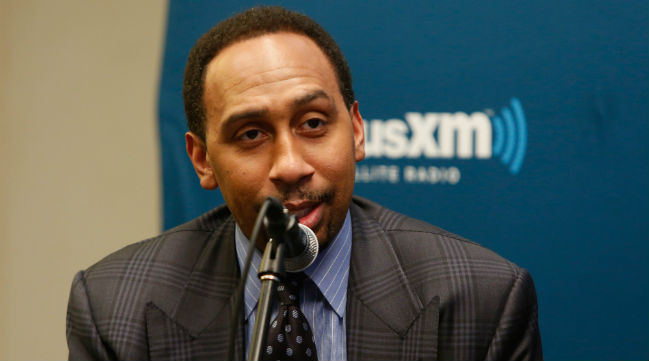
LeBron James may not want to fight Kyrie Irving, but it sounds like Stephen A. Smith certainly wants to start a fight with LeBron himself. If you can even believe it, the crab rangoon skeptic and ESPN reporter is injecting himself into the NBA’s most peculiar offseason story by ranting on the radio about James and the Cavaliers after it became public that Irving requested a trade out of Cleveland.
After James flatly denied that he’s eager to get Kyrie Irving off his team, Smith responded on his radio show Monday with a 15-minute rant to open the show that included a long list of claims.
https://soundcloud.com/sportsrapport/stephen-a-lebron
James quote-tweeted a Slam aggregation that came from a report Smith himself gave earlier this week. Stephen A. seems to think James saying “get another source” was a slight of the ESPN reporter more than the news itself, and he was ready to go off.
“I’m about to say something here,” Smith said. “I’m going to openly confess that what I’m about to say—it’s personal.”
“He’s talking about me. He’s talking about what I reported. And what I reported is that if LeBron James was in front of Kyrie Irving, I was told QUOTE ‘He would be tempted to whoop his ass.’
“That’s a quote. That’s what was TOLD to me. I did not speculate. I did not put that out there. It was TOLD to me. VERBATIM. In that manner. ‘Tempting.’
[ … ]
“It wan’t meant to be taken literally. It was meant to highlight his level of frustration for what he perceives to be something that Kyrie Irving is doing.”
It’s all very, very loud, and Smith is clearly passionate about this. Smith says he’s upset about the tweet because he’s popular enough that players come to him directly when they have a problem with his reporting. Being publicly critical is, in his mind, not the best course of action against someone who makes a living being publicly critical of sports stars.
“Ladies and gentlemen LeBron James has access to my number. If it was almost any other superstar in the league, I’d have heard from them. They would have called me directly. I’m not bragging, but I got it like that.”
Smith says that James doesn’t come to him for 1-on-1 interviews because he’s still mad about his criticism of his play against the Dallas Mavericks in the NBA Finals. Three times he mentions James “stinkin up the joint in the NBA Finals,” while saying that “I understand LeBron doesn’t want to sit down with me. Fine! I could care less!”
“You all caught up in your feelings,” Smith said, trying to normalize his voice once more.
Smith also thinks he’s going to bat for journalists of every kind in this defense if his work, but in it he overexposes himself.
“One of the things I pride myself on saying is that I’m objective in pursuit of the facts. But once you acquire the facts and disseminate it to the masses you can be subjective in your opinions about those things. And you move forward from there.
[ … ]
“We never report everything we know. Contrary to what some of you out there may believe, we do exercise decorum and professionalism and we do make a concerted effort to quell whatever biases exist inside of us as human beings. But I gotta tell y’all, there are some moments wen a professional athlete literally temps you to go nuclear on them. And I stand here before you today right in that zone when it comes to LeBron James.”
It’s fitting that Smith spends the preamble of his rant explaining the ethics of good journalism, because it’s something he’s often misconstrued in the past. The message from Smith is clear: journalists don’t report everything they hear. That’s a great rule of thumb, and definitely something people often misunderstand. But the problem with Smith is that if you report without bias and then are hyper-critical, it inevitably impacts the story as it evolves. This kind of thing doesn’t happen in a vaccuum: it shapes the story as it happens. And if something you hear is hearsay, or exists for its own purpose, reporting it and then forming an opinion on it after the fact is damaging. And it’s something the topic of a report just might respond to.
What Smith does on the radio when he’s screaming and raving about being wronged by an NBA player, that’s not journalism. It’s a show, macabre and destructive of the journalistic aims he claims to be defending by screaming about ethics in reporting.
Because all the hedging Smith does about James in the segment — all the times he says he respects him and how great he is as a person and a player and a businessman — comes undone when he threatens to do his journalistic duty and report something that’s apparently gone unreported since before James’ initial Decision a decade ago.
“What if I got into the REAL story of what happened with LeBron James against Boston the year before — or that spring when he decided to leave Cleveland and take his talents to South Beach? But we don’t want to get into that.”
That real story, if it’s real and as vetted by “over 30 sources” like his reporting about LeBron and Irving last weekend, would surely be one of the bigger NBA stories of the summer. All he has to do is put it out there in the world. Instead, he’s chosen to imply that James wanted to fight Irving, and suggest that James leaked the Irving trade talks despite presenting no clear proof it was James and his crew that did it.
All of that can be true, of course, but it’s difficult to tell when you consider the source.






